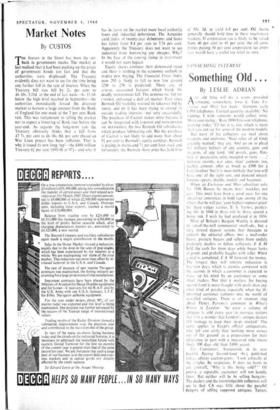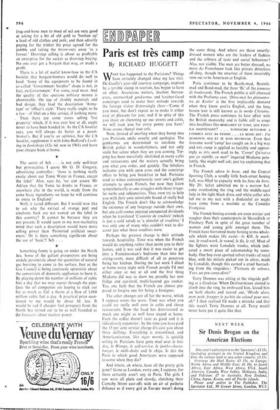Something Old . . .
CONSUMING TER EST
By LESLIE ADRIAN
ANY old thing ssilt do, it seems, provided someone, somewhere, loves it. Take Ex- ( hange and Mart last week : 'Genuine early GPO telephones. Limited quantity available.' No kidding. I wish someone would collect mine. More convincing: 'Rare 1890 Ericsson telephone, working order.' I'll bet it is. too, which is more than you can say for some of the modern models.
But most of the collectors are mad about v,eapons and uniforms. 'Nazi relics of all kinds urgently wanted,' they cry. And go on to plead for military helmets of any country, guns and ‘scapons of any kind, 'old pistols, guns, flint- lock or percussion, mint, mangled or rusty . . Samurai swords, war axes, ships' cannons (no, really), armour, offer as much as £500 for a Colt revolver 'but it is most unlikely that you will hme one' of the right sort, and demand miscel- laneous spears, shields, medals and bayonets.
When an Exchange and Mart advertiser asks for 1936 Rovers he means boys' weeklies, not cars. This must have been a good year, for one advertiser announces in bold type among all the others that he will pay 'your highest topmost price' for these vulgar rarities. E. S. Turner, predict- ing this in 1948 in Boys will he Boys, scored a home run. I wish he had predicted it in 1936.
Most of Britain's Bargain Weekly is devoted to run-of-the-mill commercial small-ads., but a very shrewd deposit system, that threatens to convert the editorial offices into a mail-order house, protects buyers and sellers from unduly predatory dealers or fellow collectors. E & M hold the cash for thret days while buyer looks at goods and probably haggles with seller. When a deal is completed, E & M forward the money. The longest they will tolerate indecision is fourteen days, which is eternity compared with the seconds in which a customer is expected to make up his mind by an auctioneer or some street traders. Not that it matters, for buying second-hand is more fraught with perils than any other kind of purchase, especially when the ill- informed customer ventures into the world of so-called antiques. There is an ominous ring about Denys. Parsons's comment in What's Where in London: 'So great a volume of antiques is sold every year to overseas visitors that it is a wonder that London's antique dealers still manage to keep their shops stocked.' The same applies to Egypt's official antiquarians, v.ho tell you airily that 'nothing more comes out of the ground' as a preparation for their reluctance to part with a treasured relic (more likely 300 days old than 3,000 years).
The Consumers' Association, in its new booklet Buying Second-hand (3s.), published today. advises auction-goers: 'Look critically at the articles. Be suspicious. It does no harm to ask yourself, "Why is this being sold?"' Of coo re, a reputable auctioneer will not handle fakes'. But neither will he be selling bargains. The dealers and the knowledgeable collectors will see to that. CA says little about• the parallel dangers of selling supposed antiques. Totters
(rag-and-bone men to most of us) are very good at asking for a bit of old gold to 'freshen up' a load of old clothes and junk, and then adroitly paying for the trinket the price agreed for the jumble and taking the throw-outs away 'as a favour.' Doorstep selling is about as profitable an enterprise for the sucker as doorstep buying. No one ever got a bargain that way, or made a profit.
There is a lot of useful know-how in the CA booklet that bargain-hunters would do well to heed. 'Some of the equipment to be found in so-called "Government Surplus" shops is not, in fact, ex-Government.' For some, read most. And the quality of this spurious military manna is abominable. On top of shoddy materials and• bad design, they load the description 'Army- type' or 'officer's style.' There really ought to be a law—of libel on a fine service, if nothing more.
Then there are some stores selling 'lost property' which, if it was ever lost at all, ought never to have been handed in. As the CA booklet says, you will always do better at a pawn- broker's. But if you're an optimist, buy the CA booklet, supplement it with John Bedford's Look- ing in Junkshops (12s. 6d. new in 1961) and leave your cheque book at home.
The secret of Sch . . . is not only well-kept but provocative. I quote Mr G. D. Gregory, advertising controller : 'there is nothing really exotic about our Tonic Water in France, except the label.' Also, says he, 'we can assure Mr Adrian that the Tonic he drinks in France, or anywhere else in the world, is made from the same basic ingredients we hope he will continue to enjoy in England.'
Well, it tasted different. But I would now like to ask why the extract of orange peel and cinchona bark are not named on the label in this country? It cannot be because they are not present. It would seem to my non-marketing mind that such a description would have more selling power than 'Permitted artificial sweet- eners.' Or is there something significant about the use of 'basic'? Sch . . .
Something funny is going on under the North Sea. Some of the gallant prospectors are being unduly pessimistic about the quantities of natural gas bursting to come to the surface. Just as the Gas Council is being cautiously optimistic about the conversion of domestic appliances to burn it. By playing down the number of millions of cubic feet a day that we may expect through the pipe- lines the oil companies are hoping to stick out for as much as 31-cl. a therm at a flow of 1,000 million cubic feet a day. A practical price men- tioned to me would be about 3d. less. It would be sad if cheaper fuel prospects from the North Sea turned out to be as well founded as the forecasts about nuclear power.



































 Previous page
Previous page